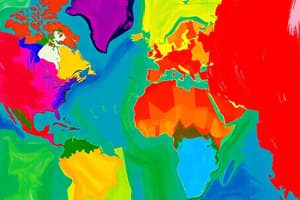Podcast
Questions and Answers
What is the fundamental cause of both war and change in the international system according to the theme of international politics?
What is the fundamental cause of both war and change in the international system according to the theme of international politics?
- Consistent rates of growth in power
- Uneven rates of growth in power (correct)
- Even rates of growth in power
- Random rates of growth in power
Which theory suggests that conflict behavior occurs if and only if a mutual structure of expectations is disrupted?
Which theory suggests that conflict behavior occurs if and only if a mutual structure of expectations is disrupted?
- Power Transition Theory
- Rummel's approach to international conflict (correct)
- Long Theory Cycle
- Hegemonic stability theory
What is correlated with war according to Rummel's theoretical propositions?
What is correlated with war according to Rummel's theoretical propositions?
- Power parity (correct)
- Power stability
- Power transition
- Power imbalance
Which of the following theories focuses on major powers and the impact of transitions and power redistribution in the international system as a whole?
Which of the following theories focuses on major powers and the impact of transitions and power redistribution in the international system as a whole?
Who proposed the Long Theory Cycle?
Who proposed the Long Theory Cycle?
What occurs if there is a significant shift in the balance of powers, according to Rummel's theoretical propositions?
What occurs if there is a significant shift in the balance of powers, according to Rummel's theoretical propositions?
Flashcards are hidden until you start studying
Study Notes
International Politics and Conflict Theories
- The uneven rates of growth in power are considered the fundamental cause of war and change in the international system.
Theories of International Conflict
- Hegemonic stability theory (Gilpin, 1981) focuses on the role of a dominant power in maintaining stability.
- Long Cycle Theory (Modelski, 1978; Goldstein, 1988; Thompson, 1988) examines the rise and fall of dominant powers.
- Theories about Preventive War (Levy, 1987) explore the concept of preventive war as a strategy to prevent an adversary's growth.
- Power Cycle Theory (Doran and Parsons, 1980) analyzes the cycles of power rise and decline.
- Power Transition Theory (Organski, 1968; Organski and Kugler, 1980) focuses on the impact of power transitions on international relations.
Rummel's Approach to International Conflict
- Conflict behavior occurs when a mutual structure of expectations is disrupted.
- Tension and hostility arise when there is a significant shift in the balance of power between states.
- Conflict behavior is only triggered by a significant shift in the balance of power.
- Power parity is correlated with war.
- A growing weakness of the status quo compared to the anti-status quo party is particularly correlated with violence.
Recent Research Directions
- Research focuses on the impact of changes in power ratios between states.
- Empirical analysis explores the causes and conditions of international conflict.
Studying That Suits You
Use AI to generate personalized quizzes and flashcards to suit your learning preferences.




